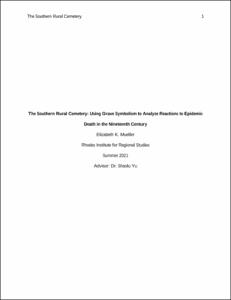Please use this identifier to cite or link to this item:
http://hdl.handle.net/10267/35969| Title: | The Southern Rural Cemetery: Using Grave Symbolism to Analyze Reactions to Epidemic Death in the Nineteenth Century |
| Authors: | Mueller, Elizabeth |
| Keywords: | Death;Symbolism;Cemetery;Epidemic;Memphis, TN;Institute for Regional Studies |
| Issue Date: | 1-Aug-2021 |
| Abstract: | In the mid-nineteenth century, the American rural cemetery movement moved beyond the Northeast and permeated the South with garden landscapes and Victorian symbolism. Culture and experience distinctively shaped Southern portrayal of the movement’s hallmarks. The South’s relationship to death through war, epidemic, racial and economic strife transformed not only the rural cemetery’s landscape and symbolism but also the South’s attitudes towards mortality. Existing literature does not acknowledge how events of overwhelming death affected the movement’s romanticized views of death. Asa case study, this paper applies a code of symbolism to analyze grave markers at Elmwood Cemetery in Memphis, Tennessee and compares changes over time with first-person accounts of the 1878 yellow fever epidemic. This research has current implications because it studies people’s relationship to death in response to a severe epidemic—a reflection of how COVID-19 might change how we know and treat death in the future. |
| URI: | http://hdl.handle.net/10267/35969 |
| Appears in Collections: | Rhodes Institute for Regional Studies |
Files in This Item:
| File | Description | Size | Format | |
|---|---|---|---|---|
| Elizabeth Mueller_RIRS Final Project.pdf | 2.52 MB | Adobe PDF |  View/Open |
Items in DSpace are protected by copyright, with all rights reserved, unless otherwise indicated.